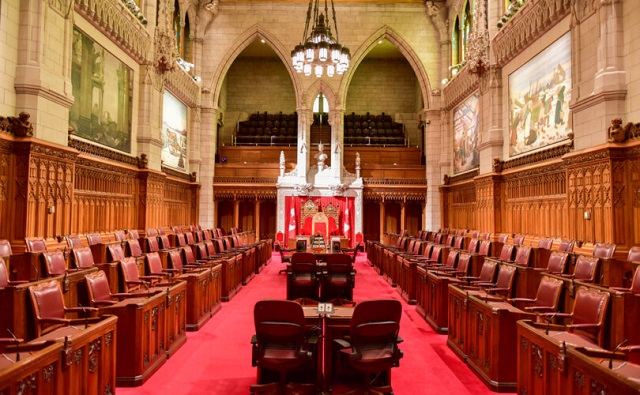Media
Liberal-appointed senator brags about getting media to censor political opponent’s op-ed

From LifeSiteNews
Ontario Senator Lucie Moncion, who was appointed by Trudeau in 2016, told the Senate she was able to get a August 21 piece published by Senator Donald Plett, who serves as the Opposition Senate leader, edited from its original form.
A Canadian Senator who was appointed by Prime Minister Justin Trudeau boasted to her colleagues that she was able to successfully get edits made to a commentary piece published by her political rival in a well-read newspaper.
Ontario Senator Lucie Moncion, who was appointed by Trudeau in 2016 and is a former banker, recently told the Senate that she was able to get a August 21 piece published by Senator Donald Plett, who serves as the Opposition Senate leader, edited from its original form.
The incident prompted Plett to state that Canada now has a “Senate communications police.”
Plett, who is a Conservative Senator, wrote a piece in the Ottawa weekly newspaper the Hill Times titled, “Trudeau’s Experimental Senate Changes Are Turning Out To Be A Dud.”
As per Blacklock’s Reporter, Moncion took issue with what was written in Plett’s piece, telling Senators, “Inaccurate information was presented,” and that they had to “remain vigilant.”
According to Moncion, who serves as chair of the Senate committee on internal economy, she was able to get edits made to Plett’s piece. She had members of her staff make the revisions to Plett’s commentary, which included complaints about overspending in the Senate.
Moncion claimed that “[o]nce a newspaper has the facts it is free to change an article, remove it or leave it as is,” adding, “I repeat: The newspaper is free to make corrections.”
“In a democracy, it is essential to ensure information that is disseminated about our institutions is true in order to avoid contributing even passively to the spread of misinformation and disinformation that characterize our media landscape,” she said.
Senators were told that the corrections made to Plett’s piece were not due to libel, or misstatement, but rather because of a technical aspect, according to Moncion.
The Hill Times is one of Canada’s most heavily subsidized weekly newspapers, getting over $1 million in the last 18 months from grants, subsidies and sole-sourced government contracts.
Censored Senator blasts edits, says Canada now has a ‘Senate communications police’
Plett was not too pleased with the changes made to his commentary, telling his fellow Senators that the Liberals wanted to “minimize” the actual cost increases made in the Senate since Trudeau took power in 2015.
“They wanted to change the meaning of the text, trying to minimize the increase in Senate expenses since Justin Trudeau took power,” he said.
“This is outrageous. We now have a Senate communications police that will not only ‘fact-check’ what senators say or write outside the chamber, but they will also, in secret, change how you present your thoughts.”
According to Plett, the Liberal government has a pattern of “doing anything to silence dissent and opposition.”
Other Conservative Senators expressed their disgust with the fact Plett’s piece was seemingly force-edited by a Liberal-appointed Senator.
“This should concern each and every one of us,” said Senator Leo Housakos.
Housakos observed that there can be disagreement on public opinion as well as what is written in op-eds, but Senators “don’t have the right to instruct my staff to call any news outlet in the country to edit anything you say.”
This is not the first time the Hill Times has been caught editing its news pieces. In 2020, it admitted that it had deleted a column critical of then Governor General Julie Payette, at the request of an unnamed official.
When it comes to government officials trying to influence people’s opinions via the media, LifeSiteNews recently reported on how disclosed records revealed that the Canada Revenue Agency (CRA) spent over a quarter of a million dollars tasking employees to create “news” reports, some of which were published by Canadian media.
Trudeau has pumped billions into propping up the mostly state-funded Canadian Broadcasting Corporation (CBC) as well as large payouts for legacy media outlets ahead of the 2025 federal election. In total, the subsidies are expected to cost taxpayers $129 million over the next five years.
Despite the interplay of the state in media, Trudeau has claimed that Canadians must continue subsidizing the CBC and others to “protect our democracy.”
Media
CBC retracts false claims about residential schools after accusing Rebel News of ‘misinformation’

From LifeSiteNews
CBC has issued a correction after falsely accused Rebel News of spreading misinformation while itself promoting the false claim that remains of Indigenous children were found in unmarked graves at residential schools.
The Canadian Broadcasting Corporation (CBC) has issued a correction after blaming Rebel News of “misinformation” while spreading false information itself.
On April 17, CBC corrected a comment from chief political correspondent Rosemary Barton who accused Rebel News reporter Drea Humphrey of spreading “misinformation,” while repeating the false claim that bodies have been found in unmarked graves at Indigenous residential schools.
“Yes, there have been remains of Indigenous children found in various places across the country,” Barton falsely stated during a live broadcast following the French-language federal election leaders’ debate.
Her comment was in reference to New Democratic Leader (NDP) Jagmeet Singh refusing to answer a reporter’s question whether he would condemn the rash of church burnings and acts of vandalism across Canada.
“In this case you saw Mr. Singh, and this has been his position for some time, to refuse to answer questions,” Barton said during the live stream.
“Rebel News in particular traffics in misinformation, lack of facts, and as you heard in that question, which was woven with some truth and some things that weren’t true,” she claimed.
“Yes, there have been burnings of Christian, Catholic churches,” she admitted.
“Yes, there have been remains of Indigenous children found in various places around the country, which she misrepresented,” Barton falsely stated.
Despite mass excavations, there have still been no mass graves discovered at any residential schools across Canada, but politicians and media continue to promote the false narrative.
CBC was quickly called out for their false statement, which ironically came at the same time as accusing another media outlet of spreading “misinformation.”
However, even in their correction statement, CBC failed to mention that, to date, no human remains have been discovered.
“As CBC News has reported on multiple occasions, what several Indigenous communities across Canada have discovered on the sites of some former residential schools are potential burial sites or unmarked graves,” the statement read.
However, CBC is now well known for pushing the false narrative that hundreds of children were buried and disregarded by Catholic priests and nuns who ran some of the schools. As a consequence of that false narrative, since 2021, over 100 churches have been burned or vandalized across Canada in seeming retribution.
Indeed, in addition to perpetuating the “mass graves” narrative, media and politicians have even threatened to punish those who oppose it. In October 2024, CBC ran a story which suggested that “residential school denialism” should be criminalized.
John Stossel
Climate Change Myths Part 1: Polar Bears, Arctic Ice, and Food Shortages

From StosselTV
Climate zealots tell us the end is near. It’s the era of “global BOILING!” says the UN Secretary General. Climate alarmists say the Arctic will soon be ice-free and cities will be underwater! But what do the facts say?
The facts say that the climate change fanatics’ catastrophic claims are wrong.
In this video and the next, we’ll debunk 7 myths about climate change.
First up: melting ice, polar bear extinction, and climate change famines.
Here are the sources for this video:
No new record low summer ice extent observed since 2012. https://agupubs.onlinelibrary.wiley.c…
Satellite data show average annual sea ice volume largely stable since 2010: https://psc.apl.uw.edu/wordpress/wp-c…
Total arctic ice mass: http://psc.apl.uw.edu/research/projec…
Polar Bear Estimates 1993-today: https://www.iucn-pbsg.org/wp-content/…
1981: https://portals.iucn.org/library/site…
1960s: https://www.google.com/books/edition/…
Global agricultural output: https://ourworldindata.org/grapher/ag…
NASA Greening study: https://www.nasa.gov/centers-and-faci…
Malnutrition deaths: https://ourworldindata.org/grapher/ma…
Coffee production: https://www.fao.org/faostat/en/#compare
After 40+ years of reporting, I now understand the importance of limited government and personal freedom. ”
——————————————
Libertarian journalist John Stossel created Stossel TV to explain liberty and free markets to young people.
Prior to Stossel TV he hosted a show on Fox Business and co-anchored ABC’s primetime newsmagazine show, 20/20.
Stossel’s economic programs have been adapted into teaching kits by a non-profit organization, “Stossel in the Classroom.” High school teachers in American public schools now use the videos to help educate their students on economics and economic freedom. They are seen by more than 12 million students every year.
Stossel has received 19 Emmy Awards and has been honored five times for excellence in consumer reporting by the National Press Club. Other honors include the George Polk Award for Outstanding Local Reporting and the George Foster Peabody Award.
_ _ _ _ _ _
In order not to miss the next video from Stossel TV, sign up here: https://johnstossel.activehosted.com/f/1
_ _ _ _ _ _
-

 2025 Federal Election1 day ago
2025 Federal Election1 day agoBREAKING: THE FEDERAL BRIEF THAT SHOULD SINK CARNEY
-

 2025 Federal Election1 day ago
2025 Federal Election1 day agoCHINESE ELECTION THREAT WARNING: Conservative Candidate Joe Tay Paused Public Campaign
-

 2025 Federal Election2 days ago
2025 Federal Election2 days agoOttawa Confirms China interfering with 2025 federal election: Beijing Seeks to Block Joe Tay’s Election
-

 2025 Federal Election2 days ago
2025 Federal Election2 days agoReal Homes vs. Modular Shoeboxes: The Housing Battle Between Poilievre and Carney
-

 2025 Federal Election16 hours ago
2025 Federal Election16 hours agoMark Carney Wants You to Forget He Clearly Opposes the Development and Export of Canada’s Natural Resources
-

 International9 hours ago
International9 hours agoPope Francis’ body on display at the Vatican until Friday
-

 2025 Federal Election16 hours ago
2025 Federal Election16 hours agoCanada’s pipeline builders ready to get to work
-

 Business19 hours ago
Business19 hours agoHudson’s Bay Bid Raises Red Flags Over Foreign Influence

